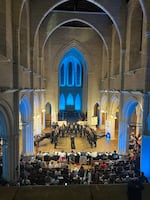Earlier this month, the University of Oregon’s Chamber Choir competed in the World Choir Games in Auckland, New Zealand. The games are viewed as the “Olympics for choirs.”
The UO choir won first place in the category of University and College Choirs and Sacred Choral Music with Accompaniment. They also received the highest score in the entire competition.
OPB’s Paul Marshall spoke with the Chamber Choir’s director Sharon Paul and students Shelby Laird and Justin Knautz about the World Choir Games.
Paul Marshall: What are the World Choir Games?
Sharon Paul: They’re like the Olympics for choirs. There were 250 choirs from over 40 countries. It’s such a unique experience to meet all the choirs and hear new music and really think about being global citizens. There are other international competitions all over the world. This one tends to attract a really wide variety of choirs.
Marshall: The chamber choir has a lot of international experience. How much pressure did you feel to represent the University of Oregon?
Paul: The one thing we talked a lot about is singing from a place of relaxation and enjoy. I really encouraged all of them to not get hung up on the fact that it was a competition or that there would be a panel of judges in front of them, checking their tuning forks and all of that and just try to create our own world when you’re in competition and we just get up and sing our repertoire, enjoy, enjoy making music together.
That’s really important because otherwise you can just get completely freaked out in your head. The best thing is to just relax and sing your program and enjoy that and whatever happens happens. We didn’t talk about winning ahead of time. We just talked about singing and making our best music together. We knew we were in competition. But I tried to emphasize that sense of just breathe, relax, and sing and enjoy singing together.
Marshall: When you’re competing in the different categories, what are you being judged on?
Paul: We competed in the University and College Choirs category and in the category of Sacred Choral Music with Accompaniment.
The requirement was four songs for each category and there were different criteria for each category. We do all four as a set and overall it can’t be over 20 minutes. Otherwise you get penalized for being over time.
For the University and College Choirs: One song had to be by an American composer. One song had to be by a living composer. One song had to be from a culture not your own. And one could be the choir’s choice which means it’s the conductor’s choice. It’s not designated like the other three categories in that it doesn’t have any narrow criteria.

The University of Oregon choir won a gold medal at the World Choir Games in New Zealand in July 2024.
Sharon Paul
For the Sacred Choral music category, it was narrower. One song had to be from a composer born before 1809, one song had to be from a composer born between 1809 and 1873, one song had to be from a living composer and one could be the choir’s choice.
There are a panel of seven judges and they’re seated right in front of you. You’re being judged on if you’re singing in tune. They’re looking at interpretation of the music. They’re also looking at diction. You get a ranking on artistry and overall performance.
That can be very intimidating because they’re literally sitting there with a tuning fork. The singers in the choir can see when a judge has hit their tuning fork to check if they’re in tune and then can see if they write something down or if they make a face so that can be very intimidating. You’re also judged on intonation, sound quality of the choir, fidelity to the score and overall artistic impression.
Marshall: What was it like when you found out you won?
Shelby Laird: The score was so unexpected and so much higher than I think we thought. I was just so proud and it was so rewarding. It felt unreal. My jaw was on the floor for like five minutes. I was like, oh my gosh. I really couldn’t believe it, but it was amazing to see everyone’s reaction of just being so proud of each other and what we’ve done. We also felt after our performances felt really good about it. That was also a really cool addition that we felt like we accomplished what we had wanted. We got some really great scores that helps.
Justin Knautz: They make it this big dramatic moment and we lost count of especially for the sacred category when we were in the audience. We lost count of how many choirs have been named already. And so when they announced the champions of this division we were in the stands. We were very excited. I could equate it to like being in Autzen Stadium during a touchdown or something during a big game.
We were quite excited and then it was fun because you find out and then we had to come up to the stage and so that we all run up to the stage and sing the national anthem. There was a mixture of pure joy and tears of happiness from members of the choir. It’s validating and it’s exciting, even though we were there to share our music. To hear your names said in first place is a really nice consolation as well too with feeling proud of how we did.
Marshall: What do you love most about singing in the choir?

A choir performs in a church as part of the competition in the World Choir Games.
Sharon Paul
Knautz: We do incredibly difficult music and we make it sound pretty good.
It makes you really proud to sing and every time you do it. I love that. There are so many great people in this choir and they’re the people that I hang out with and I get to interact with on a daily bais. We’re not just music majors, we’re in music, grad students. We have neuroscience people and cinema studies. There’s a lot of really cool people that we get to sing with and get to know. It’s a team and we get to work together and build this really awesome product.
The dichotomy of hard music that is really satisfying to get together and then getting to do it with people that you just really enjoy makes singing, especially University of Oregon Chamber Choir, really special.
Laird: We’re just so lucky to have the culture and community that’s within the choir. Dr. Paul picks brilliant music to sing. It’s engaging and the way that she’s able to help get the nuance of the music and the effect is really inspiring.
I’m one of Dr. Paul’s conducting master students. And so every rehearsal is a master class in how to run a beautiful rehearsal and how to decide what to work on and decide what to leave alone and decide how to bring a section of music to life. I’ve just learned so much just by being in the room where we’re rehearsing and where Dr. Paul is leading us. This whole trip has just been amazing to get to know our choir even better. Traveling together and experiencing all these new things and working so hard to get here. I love so many things about it. I just feel so grateful and proud of what we’ve done.
Marshall: Dr. Paul, what do you love most about directing this choir?
Paul: The magic of choir music is the community that is created and this community has really been extraordinary. They work hard, they are committed to continuing to develop their artistry. They create an inclusive community where everybody helps each other. It’s just a privilege to stand in front of them. I love rehearsals because that’s where much of the magic happens. So I just feel completely privileged to stand in front.
